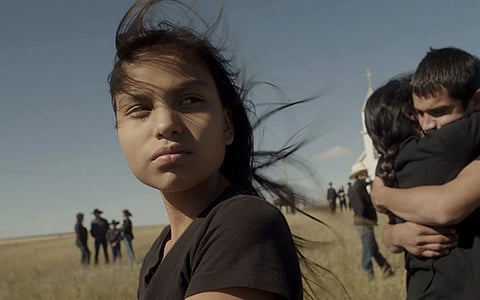
- In-Depth Stories
- Web Stories
- Reviews
- News
- FC Lists
- Interviews
- Features
- FC SpecialsFC Specials

Simplicity is the bravest decision to execute. Chloé Zhao falls directly into the category of a recent wave of filmmakers who adopt a semi-documentary, semi-fictional approach to their art. In India two prominent filmmakers who fall under this category would be Prateek Vats and Arun Karthik, the latter being particularly famous for spending months at a time, living in the location where the story is set.
This film is a testament to how simple things shown within a space that gives off a lived-in feel can transcend into the extraordinary. Chloé Zhao is not working with very complex characters. She is dealing with characters who have difficult lives. At the heart of her film is this question: if life on the reservation is so difficult, why don't they just leave? For more than half of the film it feels like, at least for the protagonist, it is possible to leave if one is not an alcoholic and if one has the iron will to push through. But slowly, the audience comes to realize that the obstacles that confront one while attempting this escape really spring from sources within the reservation that make leaving difficult. It's either Johnny's car getting blown up, or his sister's tears as he is leaving, which make leaving impossible, or the promise of a love now broken. Either way it's evident going out on your own is difficult, if for no other reason than solely because this is the only bit of land that's theirs, the only scraps of heritage that remain; the family and friends on the reservation are all that is truly theirs. How does one leave that knowing that the world outside will only take one further and further away from home?
I can imagine this film being made by a Hollywood writer. It would have ended with the protagonist breaking free because that is what laws of good storytelling dictate. But that's not the truth. Zhao lived on the Pine Ridge Reservation, first for four months, then six months and then eight months during production. There comes a point in a story where the conventional rules must be sacrificed only because there is a truth which is higher than the rules, because the story is no longer governed by rules of structure but by the vicissitudes of life, by the greys of life that know that being unable to leave is not necessarily a failure because it is the lived reality for so many Native Americans. So despite what Syd Field or John Truby says, the filmmaker owes it to the people she is writing about to tell the truth of their lives because she knows that in many ways this is their film, not just hers.
Even though at the end of the film, Johnny comes back, having been unable to leave, we don't see it as a failure of his journey. The film ends with a voiceover narration from Johnny. The last line is, "and when the wind blows harder, we know to lean into it so as not to be blown away by it." You know when you hear this that staying back was the right decision for him. But even before this line hits, we are glad to see Johnny walking back to his house. His sister is crying on the porch steps. Seeing him, she smiles a little and then sprints to hug him. But the decision to stay back being the right one comes much before this. When he sees his girlfriend at her family gathering, we know something is off. Even before that there is a moment so sublime it could not have come without the writer having seen it and lived it first herself. Johnny has said goodbye to his mother and sister. One movie I thought of repeatedly while watching this was Andrea Arnold's Fish Tank. That too is a story about a family of three – two siblings and a mother. There too, the protagonist must attempt to flee her condition and propel her ambitions to freedom. There the farewell scene is the heart of the film with Kate Jarvis's character dancing with her sister and her mother for the first time to the song 'Life's a Bitch'. In Zhao's film, the moment of the farewell is short but not rushed. They hug. There's a close up of Johnny's hand holding his sister and mother together. That's it.
After this he wanders to the mountains. He yells two words that echo through the mountains, an act signifying perhaps an end. But the echo is so important. It's not that the echo twists the words. While watching it all I remember feeling is that I loved it. But in writing about it, I realize that echo had a very different function. Now I feel, while working back from the end, that perhaps the echo pulled him back. In Bengali, we have a word called 'haatchhani'. It means a force that calls us back, or keeps us back and prevents us from going forward. Maybe, when Johnny says 'Monkey', a nickname we later find he calls his sister by, maybe the echo of that word and the sound of his voice is what is pulling him back.
To go into an unknown world without a camera, to see subjects as people first, to go beyond their oppression and ask them about who they wanted to be when they were six – that is the stuff of humanity that lends Zhao's films a pulse of life being lived in the now. She is creating fiction out of real lives; she is structuring truth into a story so we might understand it better.